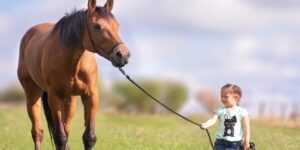I sit at a walk-in picnic site overlooking the swollen stream. A steady flow of people goes by on the pedestrian park road—runners, bikers, walkers, and the occasional rollerblader. Intensely observing the movement of thought/emotion with no more interference than the water rushing by, a deeply meditative state ensues.
It’s not any form of hypnosis, or self-induced state of reverie. It’s a state in which symbolic activity of every kind—words, remembrances, associations, even recognition—ceases. And it is the highest action of which a human being is capable.
The sounds of the rushing water, the sights of the people and the many shades of green in the new foliage, the smells of new growth, and the touch of a light wind are experienced in the moment, and let go as they pass. Thoughts slow to a trickle, and stop altogether. A completely different state of being comes into being within one. One is beyond the world without being separate or outside of it.
Just then I hear the clomping of horse hooves on the path behind me. I don’t turn, and the horse comes into view in my peripheral vision. It stops. I look at the woman rider, who is followed by another woman on horseback. She says nothing, just squeezes the horse’s belly to get the animal moving again.

The horse doesn’t budge, but simply stares at me with one eye. “Say something,” the woman says a little sharply, “it doesn’t know what you are.” I smile, and say ‘hello horse,’ and sure enough the horse walks on. Still annoyed, and missing the irony, the rider says nothing.
Later, writing about the incident in my journal, I recall an experience with my young nephew many years ago, and wonder if it’s essentially the same thing, with implications far beyond the personal.
It was my youngest sister’s wedding, and my oldest sister’s boy was two and half. I’d been in the home state (not to be confused with the homeland) for a week and had spent a good deal of time enjoying with him. Brett was very bright, mischievous, and energetic little boy, and we’d become fast friends.
The large living and dining rooms in my parents’ old house had been opened up, and were full of people. The wedding presents had been carefully placed along the walls, as part of the 12-step Catholic wedding ritual, and my sister and her new husband were going from gift to gift and person to person.
Brett walked up to me sitting quietly in a corner observing the entire scene, and said, “What are you?” Thinking he had simply confused his pronouns, I replied, ‘you know who I am Brett, I’m your uncle.’
He shook his head and walked away. A few minutes later the little guy came back and asked the same question, more insistently. “What are you?” ‘I don’t know what you’re asking me Brett,’ I replied. Clearly frustrated, the two-year-old stomped off.
Some minutes later he came storming toward me from across the room, and I knew I was in for it. At the top of his little lungs, with enough volume to turn the eyes in the room in our direction, he bellowed: “WHAT ARE YOU??!”
There was no escape. I had to find out, and find out quickly, what the little fellow was asking me. Ignoring the gaze of family, friends, and relatives, I looked into his eyes and asked myself, ‘What is he asking?’
In a flash of insight I saw it. His rapidly developing brain had naturally formed a category for people, in terms of all the people he knew. Everyone belonged in that category except me, so he wanted to know what I was, because I was different from the rest of the people.
I hadn’t realized I stuck out that much, and that the difference was obvious to even small children, but there it was. With the non-verbal understanding came a moment of silence, and the end of my desire to escape the situation. Holding his gaze, I simply said, ‘I’m a human being Brett, a human being.’
His eyes lit up, and a big smile came over his face. “Being, being,” he repeated, and walked away, contented.
A long time ago I had a discussion with an academic philosopher about the emergence of a new species of human being amidst the old. Surprisingly, he didn’t dispute the possibility, or even the urgency. His main argument was an ironic one–that it would lead to inter-species conflict.
Of course that’s what we’ve had and still have with other species, which is replicated as war amongst humankind. The new human being doesn’t live by conflict in darkness however, but ends conflict and lives imperfectly in the light.
Despite exponentially increasing scientific knowledge of genetics, most of it is being used to provide excuses and rationalizations in the psychological and social spheres.
Transmutation isn’t a difference from birth or by birth. Radical change can only be brought about through the hard work of consciously questioning and observing ourselves as we are.
The old human species is dead; can the new human being now emerge? Don’t have any more children unless you take up the work of transforming yourself, which has nothing to do with the Obamacon by the same name.
Martin LeFevre

Comments are closed.